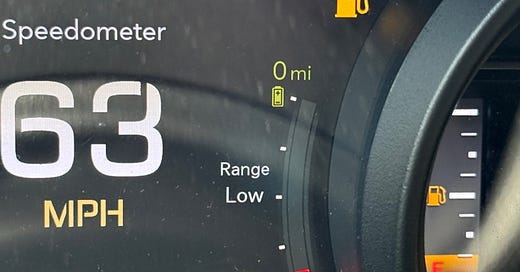I just dropped my Hertz Rental car off with less than a gallon of gas left in the tank and I feel extremely satisfied. As the red warning light went on about 40 miles from O’Hare, I wrestled with the consequences of running out along the highway, missing my flight back to NY (little did I know it would be delayed anyway). But there was something exhilarating in the continued cross calibrating my distance away from the airport with what the digital tank told me. Of course, I do this with my EV at home all the time, driving my family nuts with knowing we have 28 miles to get home and 30 miles of electric in the battery. But something about pre-paying for gas and knowing that they charge 3x the normal rate if you don’t take that option and don’t top off right before returning, that the need to squeeze every last ounce of gas in the tank makes the game even that much more critical. Then I thought, this might be a fun Substack—digging into what is the deeper meaning of living on the edge. Then I thought, “what a first-world and absurd thought that is that I really am living on the edge.” Give me a break.
I immediately went into the thoughts of ICE raids on immigrants. Guys in baseball caps and masks showing up in vans like the gestapo and taking people away from Home Depots, construction sites, vineyards and wineries, restaurants and anywhere there might be immigrants trying to make a living. I immediately went to my grandparents and great parents who immigrated from Europe and came to America, truly living on the edge, having escaped pogroms or the holocaust. What would they be thinking seeing the injustice from America’s current government abusing the protections in the constitution. This was not the American story they helped write.
I then thought about the fireside chat I just had in Milwaukee as part of the NIVA conference. A gathering of the National Independent Venue Association, an organization that was founded at the start of the Pandemic when the entire live entertainment industry was on the edge of going out of business. March 2020, almost 3000 independent music venues across the U.S.—all shut as gathering for shows was not allowed. This was not about running out of gas--this was a road closure, full stop. If not for heroism of Dayna Frank of NIVA and Frank Riley of NITO (who I had the honor of giving the first Visionary Award and then sitting with for a 45-minute public fireside chat), the SVOG support from the Government would not have saved all of our asses in the business. The Shuttered Venue Operating Grant was a program (a critical life-line) that allocated over $16 billion in grants to eligible venues, theatres, live performing arts organizations, museums, zoos, theatres and talent representatives so long as they were independent in nature.
What is interesting is these same venues and organizations continue to be living on the edge. NIVA released this week at the conference a comprehensive economic impact study showing that 64% of the independent stages were not profitable in 2024—yet, the sector is playing a significant role in economy contributing $86.2 billion directly to US GDP last year alone—more than the U.S. Beer industry, gaming and the airlines. Yet, our cultural industry is living on the edge and running out of gas.
Frank Riley, my friend and founder of High Road Booking, a talent agency that has some of my all-time favorite artists, from Wilco, Patti Smith and the Violent Femmes spoke so passionately about his love of music and the importance of art and artists in our society. Having the consolidated privilege of lunch, dinner and then the public “fireside” with Frank, I was reminded about why I love working in the live music business –while it is certainly living on the edge, it is that adrenaline, that uncertainty, the spontaneity, and the challenges that makes it all so fulfilling. It is not easy putting on shows and trying to balance the economics in a consistently changing environment. Creating culture is not an easy day job. We are privileged to do what we do with some incredible euphoric moments. And at the same time, lets also try and remember that there are many more who don’t have the luck to put on shows and work with all the artistic snowflakes, but are running for their life from ICE.
Frank reminded me to appreciate the measurement of success is not about the financial treasure at the end of the day, but the spiritual treasure. Stephen Parker, the Executive Director of NIVA stated, “For many of us, it’s not just a business model, it’s sacred. It’s something (our industry) you want to protect.” I guess my takeaway from this week, even sometimes with an empty tank, the fumes of passion can get you there.





The wine industry too understands “running from ICE” as they grab important viticulture management company owners in Willamette Valley. Seems like we are not first world anymore.